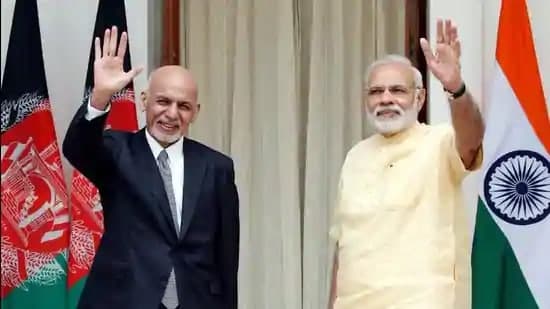Decoding India’s Move in Kabul
India’s powerful national security adviser, Ajit Doval, undertook a long-overdue visit to Kabul last week. It took place soon after external affairs minister S Jaishankar promised more military support to Afghanistan. Though the specifics of such support are unclear, whatever India offers is unlikely to tilt the military balance in Kabul’s favour after the withdrawal of the United States (US). Why, then, is India opting to intensify support for the Afghan government when the world is hedging its bets and engaging with the Taliban?

With negotiations between Kabul and the Taliban in Doha gridlocked, intensification of fighting on the ground, including targeted assassinations of civilians, flourishing factionalism within Kabul, lack of clarity on how US President-elect Joe Biden will proceed with the withdrawal, and an assertive Pakistan, the main question facing India is how long can President Ashraf Ghani withstand these pressures, and what next?
The central driver of India’s Afghanistan policy is its desire to ensure a strategic balance between Afghanistan and Pakistan. Given the power asymmetry between these two countries, such a balance, from an Indian viewpoint, then, is to enable Kabul to influence the terms of talks with Pakistan-supported forces such as the Taliban. To that effect, New Delhi has found determined, if embattled, allies in Ghani and Vice-President Amrullah Saleh.
But there is no guarantee that New Delhi’s approach will yield results. In fact, given India’s mounting security challenges with both Pakistan and China, there are valid concerns about India losing ground entirely if Kabul collapses. So why intensify support for Kabul even if India is unwilling to overtly engage with the Taliban? After all, there is no need to bind itself further to the Ghani government. History offers clues to better understand India’s decision.
In February 1989, Prime Minister Rajiv Gandhi dispatched AK Verma, the then chief of India’s external intelligence agency, Research and Analysis Wing (R&AW), to assess the longevity of the Najibullah government, which was under pressure from Mujahideen attacks. Verma returned upbeat and said Najibullah can last “indefinitely” with Soviet support. Parallel to Verma’s visit, India had begun outreach to different Mujahideen factions and found a surprising convergence of interest.
Successful outreach to the Mujahideen, hidden from public view and held anathema till that moment, helped India embrace the new realities after Najibullah’s ouster in 1992 when Soviet support ended. For now, there is no evidence that India’s unofficial outreach to the Taliban and vice-versa has generated an understanding of that sort. But even if such an understanding exists, it is unlikely to be made public by either side — similar to what happened with the Mujahideen.
Overt engagement with India will complicate the Taliban’s relations with Pakistan when it can least afford this. For India, overt diversification risks expediting Ghani’s political collapse instead of ensuring an internal balance within Afghanistan. Both New Delhi and the Taliban know that they can’t remain aloof forever, especially if the latter comes to power. India’s decision to support Ghani, then, is a sign that there are no endgames for India in Afghanistan. Thus, it would rather accept a setback in its pursuit of a balance between Kabul and Islamabad and securing the few gains that Afghanistan has made over the last two decades, instead of coming across as an opportunistic.
The other aspect of India’s decision has a sharper edge. On August 15, 1975, India received a strategic shock in the form Sheikh Mujibur Rahman’s assassination in Bangladesh. The rise of the pro-Pakistan army chief Ziaur Rahman as president in Dhaka generated tremendous anxiety in New Delhi. In a now-declassified top-secret report, R&AW assessed that Pakistan would “exercise a pervasive influence in various ministries and departments of the Govt of Bangla Desh, especially in the foreign office [and] … would widen the differences between India and Bangla Desh”.
In response (in first of its kind archival evidence seen by this author), R&AW recommended that the political leadership take all feasible measure to “soften up areas which are contiguous to Indian territories where we are especially vulnerable” and sought re-appraisal of relations with Pakistan. As a first step, it wanted Indira Gandhi to seriously consider the “idea of providing strong support to anti-Pakistani activities in NWFP, and Baluchistan now being carried on from bases in Afghanistan”. To relieve Pakistani pressure on India through Bangladesh, R&AW thought it was necessary “to intensify pressure on Pakistan through Afghanistan”.
Given India’s security challenges today, it is entirely possible that Doval’s visit is a signal to Pakistan that the latter is likely to inherit a costly, violent, and ultimately digressionary mess in Afghanistan if it continues to pursue revisionism. Such signalling is buttressed by India’s belief that even if the US leaves lock stock and barrel, neither Iran nor Russia, despite their alliance with China and engagement with the Taliban, would prefer an Islamic Emirate in Afghanistan — offering India space to manoeuvre, and influence the outcome of the Afghan war(s) over the next six-to-12 months.
Saleh’s unsubtle tweet: “Had a pleasant meeting with NSA Ajit Doval of India. We discussed the enemy. It was an in-depth discussion”, therefore, must be read for what it is, ie, a real, continuing, challenge to Pakistan.